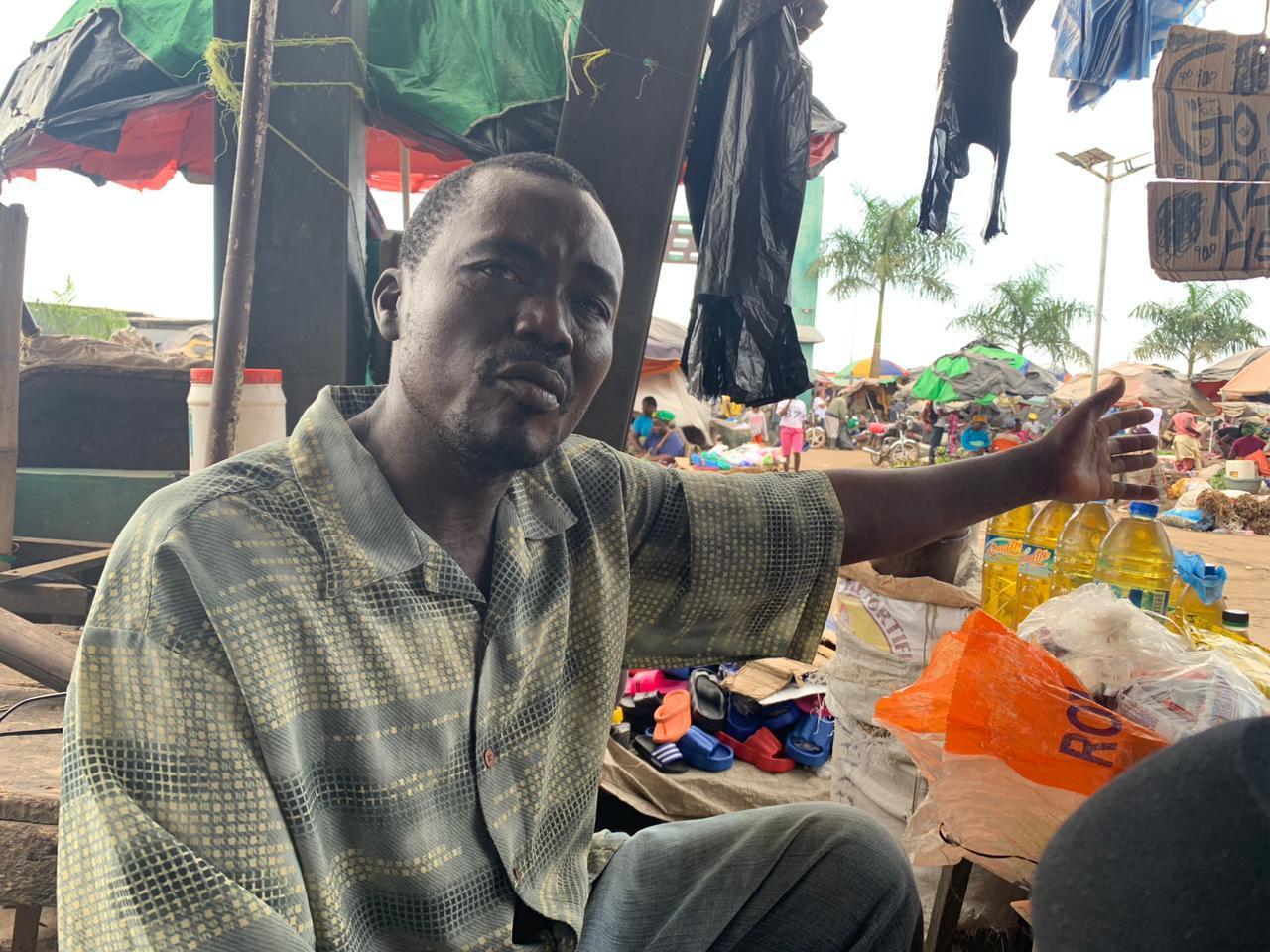Africa-Press – Liberia. Pst. Boi Sarma, pays LD$60 daily for his three tables, amounting to over 11,000 Liberian dollars annually- Photo: Siaway T. Miapue
In bustling markets like Omega, Duala, and Waterside, the sights and sounds of commerce are accompanied by a persistent stench of uncollected garbage and cries of frustration. At the heart of the discontent is the Liberia Marketing Association (LMA), a body established to oversee the welfare of marketers and maintain market spaces. Instead, it faces mounting allegations of corruption, mismanagement, and negligence
The LMA was created in 1976 by an Act of the National Legislature of the Republic of Liberia. It is tasked with collecting fees from marketers to fund market upkeep and services. Yet, interviews with marketers reveal widespread dissatisfaction with how these funds are managed.
“Where the money is going, we don’t know,” lamented Pst. Boi Sarma, a marketer at the Omega Market, has been with the LMA for 15 years. Sarma pays 60 Liberian dollars daily for his three tables, amounting to over 11,000 Liberian dollars annually. Despite this, Sarma observes little improvement in market conditions. “Though we ask them, we don’t get any credible information on how that money can be used… I believe these people should be called to a place of accountability,” Sarma noted.
Neglected Infrastructure
In Waterside’s New General Market, leaks in the market’s roof often leave goods soaked and ruined during the rainy seasons. Yassah M. Jainson, who pays LD$40 Liberian dollars daily for her two tables, LD$20 for each, feels abandoned. “They will not fix it; [the roof] can leak seh all your goods spoil, da na [that’s not] their business,” she said. “I really don’t know what they can do with the money; when you go question them, they can’t give any concrete reason.”
L-R, LMA Staff collects LD$40 daily from Yassah M. Jainson for her two tables down waterside market- Photo: Siaway T. Miapue
Similar issues persist in Duala Market, where Mary Tomah, a potato green vendor for over 25 years, feels the weight of unaccounted-for fees. “Every day, they [LMA] demanding 50 dollars, but we are not getting any benefits. And when you refuse, they pack your market and carry ay [it] in the office,” Tomah said, pleading for President Joseph Boakai’s intervention.
For Sonia Jallah, another marketer in Duala, the lack of security and sanitation is glaring. “Every day we come; we will clean pupu [feces]… but they can collect money from us. They say they get security in the market, but no security.”
Mary Tomah, a potato green seller feels the weight of unaccounted-for fees- Photo: Siaway T. Miapue
In contrast to the Duala and Waterside markets, the waste produced in the Omega market is collected by disadvantaged youth who are paid to do so. They gather the waste and dispose of it around the market, leading to a foul smell. In all the markets, these disadvantaged youth can often be seen using the area for shelter during the day and night, but the marketers say the presence of these disadvantaged youth increases the criminal rate in the market.
Waste produced by marketers is paid for and collected by disadvantaged youth- Photo: Siaway T. Miapue
Calls for Transparency
The LMA’s responsibility under its founding act includes improving market infrastructure, ensuring sanitation, and providing security for marketers. Yet, its accountability mechanisms remain opaque. Vendors say they rarely see receipts or public statements about how the funds collected are spent.
Though fee amounts vary slightly by market, the average daily fee is 20 Liberian dollars per table. Using the 2020 membership figure cited by FrontPage Africa, of 150,000 marketers across the country, the potential scale of LMA’s earnings is staggering. The Association could collect L$3 million daily, L$90 million monthly, and over L$1 billion annually. Yet, despite this substantial intake, basic services like sanitation, infrastructure upkeep, and security remain glaringly absent in many markets.
For over five months, efforts to get the LMA position on these issues have proven difficult. The LMA’s Public Relations Officer, Morris Brown, initially acknowledged the request for comment and promised to respond on behalf of the institution. After the follow-up, he asked that the questions be sent via WhatsApp, which was done promptly. However, despite multiple reminders, no response has been received up to the time of this publication.
This silence further underscores the very concerns marketers raise about the institution’s lack of transparency and accountability, with marketplaces forming the backbone of Liberia’s informal economy, the government faces mounting pressure to address the LMA’s role in what vendors call a “profitable mess.”
LMA Tax Obligation
According to the Liberia Revenue Authority (LRA) through its communication Manager, D. Kaihenneh Sengbeh, the LMA is exempted from paying Corporate Income Tax, Real Property Tax and Customs Duties.
This is in keeping with Section 9 (a) and (f) of the Liberia Revenue Code, which designates charitable private organizations approved and registered with the Ministry of Finance as “Exempt Persons.” According to the law, such entities are exempt from taxes, including corporate income tax, real property tax, and customs duties, to the extent provided by the Code.
Nevertheless, the LMA is subject to specific obligations under the Revenue Code. These include withholding on rent, which is an income tax applied to earnings received by landlords who lease out real property for commercial use; withholding on salaries, which is a tax on the personal income of staff employed by the LMA; and withholding on services rendered, which applies to payments made to independent consultants who are not formal employees of the association. However, the LRA’s communication boss did not say whether the LMA is living up to its tax obligation outlined by the Liberia Revenue Code.
Meanwhile, marketers continue to compulsorily pay money to the LMA daily without accountability while marketplaces remain unconducive because of poor infrastructures; leaking roofs, unsanitary latrines commercialized by private individuals, unpleasant smell, lack of security and more.
For More News And Analysis About Liberia Follow Africa-Press






